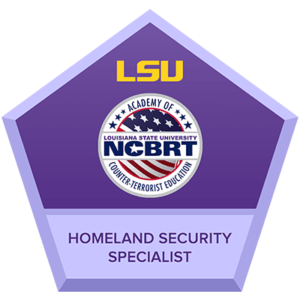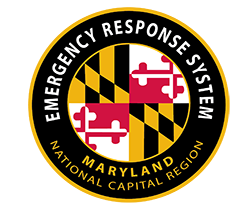 In March 2022, nine members of the Maryland-National Capital Region Emergency Response System (MDERS) stakeholder community began Louisiana State University’s (LSU) 10-week Homeland Security Specialist MicroCert program. Participants included representatives from several stakeholder agencies: the Prince George’s County Police Department (PGPD), Prince George’s County Fire Department (PGFD), Montgomery County Office of Emergency Management and Homeland Security (OEMHS), and MDERS.
In March 2022, nine members of the Maryland-National Capital Region Emergency Response System (MDERS) stakeholder community began Louisiana State University’s (LSU) 10-week Homeland Security Specialist MicroCert program. Participants included representatives from several stakeholder agencies: the Prince George’s County Police Department (PGPD), Prince George’s County Fire Department (PGFD), Montgomery County Office of Emergency Management and Homeland Security (OEMHS), and MDERS.
The LSU Homeland Security MicroCert program seeks to instill a greater understanding of how law enforcement operates within the larger homeland security enterprise. To meet this goal, the program is separated into four self-paced courses and a capstone project:
- Course 1: Homeland Security and Law Enforcement in a Post 9/11 Environment
- Course 2: Tradecraft of Modern Terrorism
- Course 3: Intelligence and Multi-Agency Partnerships
- Course 4: Critical Infrastructure and Private/Public Partnerships
- Capstone: Operationalizing Homeland Security Concepts
The first course within the program focused on analyzing the increased emphasis on enhanced coordination between law enforcement agencies after the September 11th attacks in 2001. Next, the second module outlined common terrorist tactics and targets, identified attack modalities, and discussed various protective and mitigative actions that law enforcement agencies can enact. The third unit of the program identified best practices for multi-agency intelligence gathering, analysis, and information sharing. The fourth, and final, course within the program underscored the vulnerability of critical infrastructure and the importance of public private partnerships in strengthening response efforts.
The program culminated in a capstone activity that allowed students to apply a cumulative approach to the lessons learned throughout the instructional modules. Students planned a simulated terrorist attack within their respective jurisdictions. Using personal experiences and content learned throughout the program, students then identified mitigative and protective actions to help thwart the simulated attack. A combination of instructor interaction and direct feedback allowed students to better observe the application of the course material in a realistic environment.
Stakeholders who participated in the program rated the overall course highly, stating that:
- “The LSU Homeland Security Specialist was thought provoking experience.”
- “The course was very well done, and I enjoyed learning in an online manner.”
- “The lessons learned will be very beneficial in the day-to-day activities of my job.”
With the completion of the Homeland Security Specialist MicroCert Program, MDERS stakeholders have a better understanding of potential threats to the Maryland-National Capital Region and how best to mitigate such hazards.


